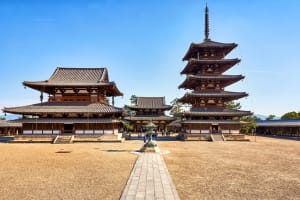
Kofuku-ji is a Buddhist temple located in Nara, Japan. It was established in 669 by the powerful Fujiwara family, who played a significant role in Japanese politics and culture during the Heian period. The temple was originally built in Yamashina, Kyoto, but was later moved to Nara due to political reasons.
Kofuku-ji was once one of the largest and most influential temples in Japan, with over 150 buildings spread across multiple locations. However, many of these structures were lost to fires, wars, and natural disasters over the centuries, and the temple's current complex is much smaller than its original size.
Despite its diminished size, Kofuku-ji remains an important cultural and historical site in Japan. Its Five-Story Pagoda, which stands at 50 meters tall, is one of the most iconic landmarks in Nara, and is a designated National Treasure of Japan. The temple also houses many important Buddhist artifacts, including statues, paintings, and scriptures, some of which are also designated National Treasures or Important Cultural Properties.
Kofuku-ji is also known for its association with the influential Buddhist monk, scholar, and poet, Kukai, also known as Kobo Daishi. Kukai was a key figure in the development of the Shingon school of Buddhism, and Kofuku-ji is one of the major temples associated with this tradition.
Explore Near Kofuku-ji
Discover 5 attractions, 5 cities, and 3 airports within 75km. Perfect for planning day trips, finding connecting flights, or discovering new destinations to explore during your visit.
Nearby Attractions & Places to Visit
5 destinations within 429m - 23.4km from your location





Nearby Cities Worth Exploring
5 destinations within 4.0km - 13.6km from your location
Airports Near Kofuku-ji
3 destinations within 39.2km - 62.1km from your location